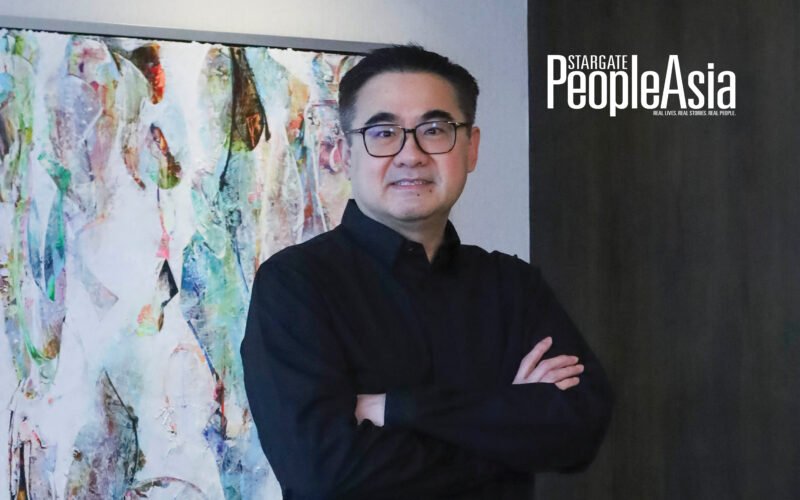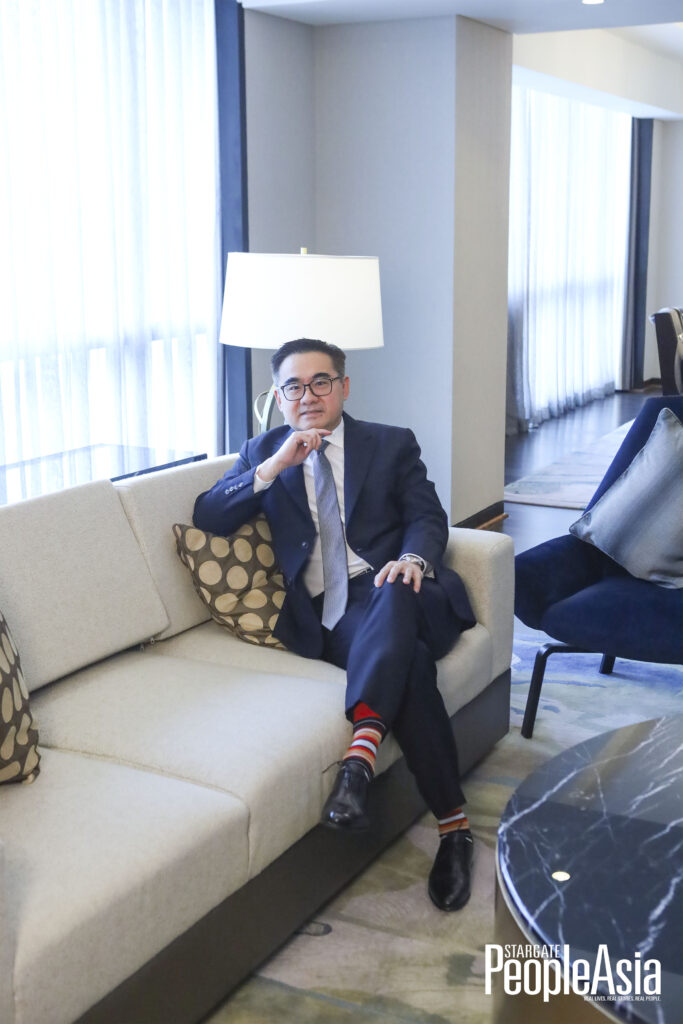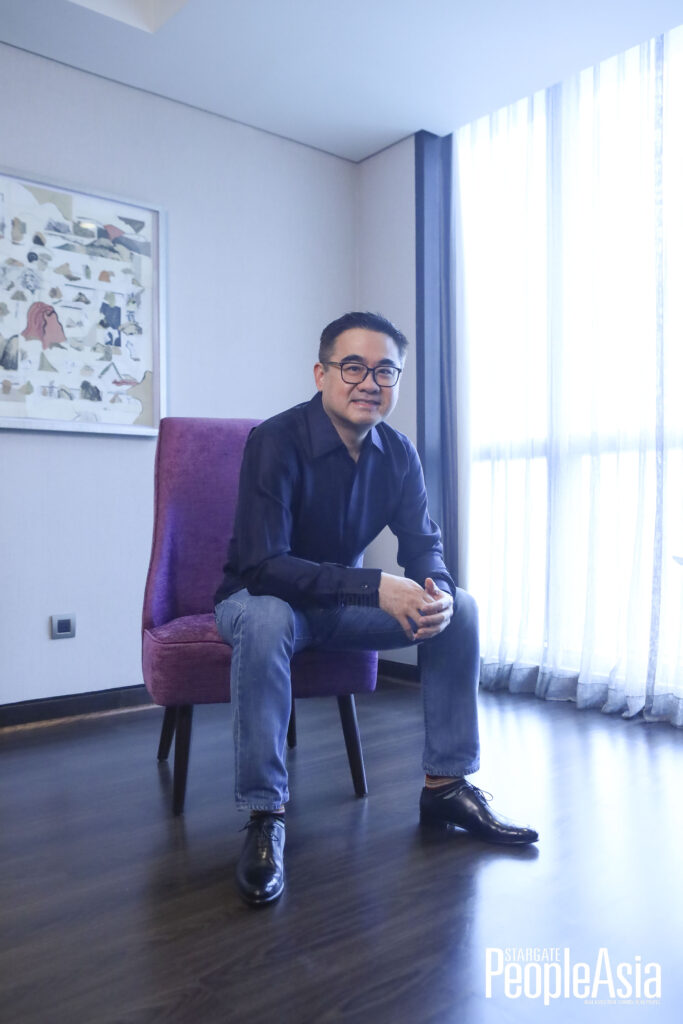Despite being a scion of one the country’s wealthiest families, nothing was handed down to him on a silver platter. Everything he has achieved, including being instrumental in the phenomenal growth of Robinsons Land, he worked hard for. But the call to give back has always been there. And when that compelling offer came along, he dropped everything to join the public sector as Special Assistant to the President for Investment and Economic Affairs.
By FRANCINE Y. MEDINA
When Robinsons Land Corp. (RLC) president and CEO Frederick D. Go announced his resignation from his powerful post to join government, his move prompted the business community to ask why. After all, under his focused leadership, Robinsons real estate and property development group rose to phenomenal success with total assets of P230 billion.
Certainly, Go’s entry in government is a boon. Still, the question that lingered in the corporate world is why Frederick would leave the Gokongwei family-owned corporation and his important role in the thriving establishment to leap into the unfamiliar territory of public service? Confessing that he had to ask his wife Winnie’s permission, Go also revealed that offers of this kind aren’t anything new.
“First of all, it was really a personal decision that I, alone, must make. I have been offered to join government in the past. But I always quickly dismiss the thought. This time though it was different because the President’s focus on bringing in investments to the country is so compelling. His desire to bring the Philippine economy to new heights is so compelling to me,” he says.
Three months later, Secretary Go — Special Assistant to the President (SAP) for Investment and Economic Affairs — is taking to his role like a duck to water. He has been meeting with various stakeholders, joining President Ferdinand Marcos Jr. on foreign trips, and huddling with the administration’s economic and fiscal think tank.
“It’s a bit of a challenge. But at the same time, it’s been very fulfilling. When you’re working in the private sector, you’re trying to achieve success for yourself and success for the company. But in the public sector, we’re trying to move from personal to greater interest,” the business leader-turned-economic czar tells PeopleAsia.
“The way I see it, it’s about moving from success to significance. It’s about the future of the country and the future of the people, which really gives me a certain sense of fulfillment that you could never have in [the] private sector.”
SAP sounds like a broad job description. Like being at the beck and call of the President whenever the latter needs advice. But Go says he has a clear picture of what he signed up for: “To harmonize, synchronize, integrate and implement the President’s priority programs and economic agenda. These four verbs best describe my role in the whole-of-government approach to achieve results or to get things done.”
Seeing the bigger picture
With his unmatched corporate achievements, Go lends credence to the President’s efforts to push prosperity and inclusive growth. He assures Filipinos that the country is on the right track in its goals: “If you ask me, we’ve improved with a 5.6 percent growth in the economy in 2023. That is larger than any country in the region. We are moving faster than China, Malaysia, Indonesia, Vietnam — faster than our neighbors. So, we’re doing good.”
The enthusiasm is palpable as he gives more examples to show that the future is looking bright for the country. He mentions reforms implemented through law such as the Ease of Paying Taxes Act, the establishment of “green lanes” to speed up the processing of licenses and permits for investments and Executive Order 32, which addresses the “streamlining of telecommunications and internet infrastructure permits,” as well as the much-debated sovereign wealth fund known as the Maharlika fund and the recently awarded concession agreement for the Manila International Airport.
He’s also passionate about implementing the National ID system. “Our priority is to come up with a digital ID, which is the foundation to any country’s progress,” he says. “How can we talk about progress when we don’t even have a National ID system? It is the foundation to financial inclusion, it’s foundational for distributing social services and financial transactions. People don’t have to line up for hours for their passport, for instance. With the National ID, the implementation of national services becomes simpler.”
And yet, despite his influential role in government — and to the President — Secretary Go somehow prefers to maintain a muted presence. He explains, “I still want to play it low-key. That’s why I always ask during events, ‘will there be media interviews?’ I shy away from these things. I’d rather talk to a private audience. I’d like to maintain that for the next four-and-a-half years and be known as the quiet or silent, hardworking public servant.”
Investing in purpose
At 55 and looking younger than his years, Go has maintained his trim figure through badminton, his choice sport. At one point, he says, he was a member of the Board of Trustees of the Philippine Badminton Association. But when he joined government, he also resigned from all his board member roles in various socio-civic groups and organizations, which included Ateneo de Cebu.
“To avoid any issues or conflicts in the future,” he asserts.
It’s been more than 30 years since he joined his family’s enterprise — his uncle, the late John Gokongwei, first invited him to join Manila Times, which the latter had just acquired from the Roces family. The elderly taipan was aware that Go loved to write and had even become editor of The GUIDON, his alma mater Ateneo’s campus paper. He was good at what he was doing so Gokongwei believed that his young nephew would make a good journalist.
Go became a business reporter, but he would later reveal in interviews that what he really wanted was, “to be like my uncle, a businessman.”
But even then, Go always placed dedication and passion in any role assigned to him and brought along that positive mindset on his way up the Gokongwei-led Summit Group’s corporate ladder.
He lets out a light laugh as he remembers his early days. “I guess what I have today didn’t come easy. I have to work hard for everything, and it hasn’t changed today. I’m still working hard for things.
“But I guess I was born this way. I cherish the opportunity to work. I look at things as challenges. I got this job because I believe I can make a difference and achieve results. If I didn’t believe then that I shouldn’t have taken this job. I guess if I didn’t believe I could do it, then why am I even here? I’m just punishing myself.”
Asked what his plans after his government stint are, he pauses and admits he hasn’t thought about it yet. For now, he’s just focused on being SAP. “Let’s put it this way,” he says. “I take this job so seriously that I’m not even thinking about what will happen after. I just want to do a really, really good job for the administration and for the country in the next four and a half years. What God has in store for me, it’s all up to Him.”
For the man who brought RLC to staggering heights, real success, he believes, can be seen in the impact of one’s work for the country and for the people. That was a compelling realization he faced five years ago: “I think when I turned 50, I became more spiritual. After achieving so much in life, you ask what your purpose in life is. Why did God put you on this earth? I also kind of figured out that I’m past half of my life already. Unlike when you’re 40, you say that you’re not yet half of 80 or something like that.”
Unguarded and candid, he concludes, “But at 50. I’m definitely past half of my life. I started to think about my life purpose. And I guess it led me to this. I can now live a life of significance.”
Photography by MYK YCO
Art direction by DEXTER FRANCIS DE VERA
Shot on location at THE WESTIN MANILA, ORTIGAS







